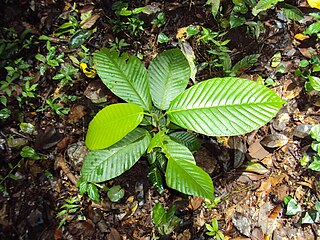
Dipterocarpus is a genus of flowering plants and the type genus of family Dipterocarpaceae.

Dysoxylum is a genus of rainforest trees and shrubs in the flowering plant family Meliaceae. About 34 species are recognised in the genus, distributed from India and southern China, through southeast Asia to New Guinea, Solomon Islands, and Australia. The name Dysoxylum derives from the Greek word ‘Dys’ meaning "bad" referring to "ill-smelling" and ‘Xylon’ meaning "wood".

Goniothalamus is one of the largest palaeotropical genera of plant in family Annonaceae.

Polyalthia is a genus of flowering plants in the family Annonaceae. There are approximately 90 species distributed from Africa to Asia and the Pacific.
Monoon glabra is a species of plants in the custard apple family Annonaceae. It is a tree endemic to Peninsular Malaysia and is threatened by habitat loss.
Monoon hookerianum is a species of plants in the custard apple family Annonaceae. It is a tree found in Malaysia and Singapore.
Monoon hypogaeum is a species of plants in the custard apple family Annonaceae. It is a tree endemic to Peninsular Malaysia.

Pseuduvaria is a genus of the plant family Annonaceae and tribe Miliuseae: with a native range is Tropical Asia.

Uvaria is a genus of flowering plants in the family Annonaceae. The generic name uvaria is derived from the Latin uva meaning grape, likely because the edible fruit of some species in the genus resemble grapes.

Meiogyne is a genus of flowering plants with 38 species belonging to the family Annonaceae. It is native from southwestern India and Indochina to Australia, including Fiji and New Caledonia. The type species is Meiogyne virgata.

Artabotrys is a genus of plants in the Annonaceae family. There are over 100 species in the Old World tropics, with 31 species in Africa. It is part of the custard apple family (Annonaceae). All species are small trees or shrubs with a tendency to climb. Leaves are simple and alternate, without hairs. Bisexual flowers are borne singly or in clusters opposite the leaves. The 6-petalled flowers are scented, and the plant bears fleshy fruits.

Monoon fragrans is a plant in the Annonaceae family. Its leaves have a fragrant smell. It is called Gowrimara in Kannada. It is found in forests of the Western Ghats of India.

Chisocheton is a genus of trees in the family Meliaceae. The genus name comes from the Greek schizos and chiton meaning "split tunic", referring to the lobed staminal tube of C. patens. Their range is from India and tropical China, throughout Malesia and south to New South Wales and Vanuatu.

Monoon is a genus of plants in the family Annonaceae and the tribe Miliuseae. Species have been recorded from the Indian subcontinent, Indo-China, Malesia, New Guinea and Australia, with introductions in West Africa. A number of species have been moved here from the genus Polyalthia.

The Malmeoideae are a subfamily of trees and other plants of the family Annonaceae.
Marsypopetalum littorale is a species of plants in the custard apple family Annonaceae native to southern China, Hainan, Java, Lesser Sunda Islands, Thailand and Vietnam.
Marsypopetalum lucidum is a species of plants in the custard apple family Annonaceae native to the Philippines.
Marsypopetalum modestum is a species of plants in the custard apple family Annonaceae native to Indo-China.
Marsypopetalum triste is a species of plants in the custard apple family Annonaceae native to Vietnam.












